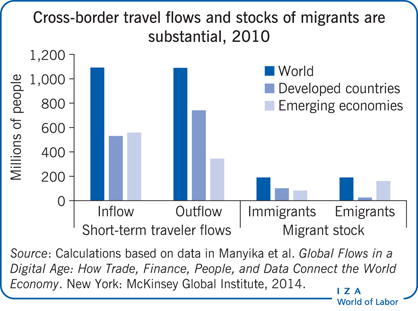Elevator pitch
The ongoing relationships between emigrants and their families, friends, and business contacts in their home countries can increase outbound and inbound cross-border travel, while cross-border tourism and business and study trips can trigger migration. New communication technologies, such as social media and video chat, only partially substitute for face-to-face meetings. In fact, the greater use of such technologies boosts demand for in-person meetings. Short- and long-term cross-border movements are becoming more complex, creating challenges for measuring immigration and for defining target populations for legislation and public policy.

Key findings
Pros
The ongoing relationships between emigrants and friends and relatives back home stimulate tourism in home and destination countries.
A country’s diaspora strengthens international business networks, which leads to growing trade and diffusion of innovation.
Advances in information and communication technologies make it easier to maintain relationship capital across borders and lower the cost of migration.
Temporary migration and travel for study, tourism, or business are effective pathways to subsequent successful settlement.
Cons
Growing global mobility and the increasing complexity of migration and travel flows reduce the usefulness of conventional statistics on flows and stocks of migrants and travelers.
Laws, regulations, and institutions developed to manage permanent and long-term settlement are not adequate in an era of increasing mobility and transnationalism.
For countries to share in the burden of providing social security to transnational populations will require new bilateral or multilateral arrangements and perhaps a greater role for cross-border portable private-sector insurance.